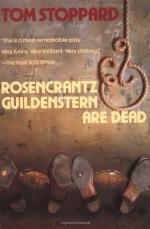|
This section contains 2,701 words (approx. 10 pages at 300 words per page) |

|
SOURCE: "Rosencrantz and Guildenstern Are Dead: Theater of Criticism," in Modern Drama, Vol. XVI, Nos. 3-4, December, 1973, pp. 269-77.
Berlin argues that, rather than encouraging active involvement in the play's events, Rosencrantz and Guildenstern Are Dead promotes a distanced, critical response. Stoppard, he asserts, "forces us to be conscious observers of a play frozen before us in order that it may be examined critically. "
Tom Stoppard's Rosencrantz and Guildenstern Are Dead entered the theater world of 1966-67 with much fanfare, and in the ensuing years it has acquired a surprisingly high reputation as a modern classic. It is an important play, but its importance is of a very special kind up to now not acknowledged. The play has fed the modern critics' and audiences' hunger for "philosophical" significances, and as absurdist drama it has been compared favorably and often misleadingly with Beckett's Waiting for Godot. However, its peculiar...
|
This section contains 2,701 words (approx. 10 pages at 300 words per page) |

|


